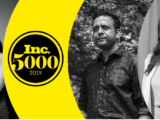Woman-founded and led, Creative Alignments has always been committed to building an inclusive and equitable business and culture. For a decade this took many forms, including hiring people from diverse backgrounds, elevating women to leadership roles, and leveraging the professional contributions and flexibility needs of mothers returning to work after taking time off to be home with children.

Diversity, Equity + Inclusion
Deepening our commitment
We’re continually learning, growing and deepening our commitment to diversity. For instance, to tap into more racially diverse talent, we opened up remote work options so that we can hire people from across the country, beyond our hometown of Boulder, Colorado.
DEI is a central part of our business
As recruiters who help our clients hire hundreds of employees a year, we have an opportunity to make an impact by partnering with employers to attract diverse pools of candidates and employees. Through our work, we are committed to making real change in our core industries, both of which have traditionally lacked diversity: technology, climate, and natural products/CPG.
Hear our founder, Peggy Shell, speak about the importance of JEDI and people-first cultures to scaling companies in this segment on The People Component of Investing.
For us, DEI is a long-term journey
We’re intentional at each step.
We work with many clients that also value DEI, and our goal is to help clients make more diverse hires into inclusive organizations.
Discovery: We kick off each search by opening up conversations with our clients about DEI to hone in on goals and expectations, understand company culture, ignite ideas and explore new approaches.
Strategy: To attract diverse candidates, we talk through how specific job requirements can limit or expand interest, craft intentional job descriptions, and creatively approach where we seek out candidates.
Presentation: We present our clients with a diverse pool of the most relevant candidates, and have transparent communication to help us further refine our search as needed.
Connection: While we are recruiting experts, we are not DEI experts. Regardless of where our clients are in their DEI journey, we help connect them with the resources needed at each step. This can include one of the diversity experts we work with to help companies expand their perspectives, attune their self-awareness, ask important questions and create lasting change within their organizations.
We regularly seek out different perspectives.
We work with diversity consultants for our own business and as resources for our clients, including Dr. Sherard Robbins of Visceral Change. For close to a decade, he has helped organizations and institutions find new and creative ways to center their professional framework in a sociosystemic way. Dr. Robbins is the author of A Diamond is a Diamond: The Core Five Components to Social Justice and the creator of the Sociosystemic Organizational Development Model.
We’re continually learning.
- CA leadership and recruiters participate on panels with others committed to improving diversity within our core industries (food/CPG and tech).
- Our staff engages with biannual diversity training with a third-party consultant.
- Staff meetings regularly include diversity learning sessions and discussions.
- Our recruiters seek out external professional development on diversity recruiting, like webinars.
- Our Diversity Working Group meets regularly to deepen our shared learning, hone our diversity recruiting processes, and create new ways to improve how we support our clients to become more diverse and inclusive.
- We are intentional about sourcing when it comes to expanding diversity on our staff.
WHY DEI MATTERS TO BUSINESS
Research and experience show that when a company commits to diversity and inclusion, it is more successful and more profitable. Many leaders argue that an inclusive culture is more impactful for recruiting and retention than offering expensive perks. Creating an inclusive, equitable culture helps employers create a competitive advantage in many ways.
#1. TALENT: Talented people are attracted to joining companies that embrace diversity. They are also more productive and motivated to stay when they know their employer is committed to diversity, equity and inclusion (DEI).
- A majority of employees proactively seek out diverse employers.
- Creating an inclusive environment supports positive relationships and fosters communication. Happy employees work harder and stay longer, which saves money on recruiting, onboarding, and training.
- Millennials, which will make up 75% of the workforce by 2025, value diversity and inclusion more and view it differently than previous generations. In an inclusive culture, they are more engaged and collaborative.
#2. INNOVATION: Diverse leadership boosts company innovation and financial performance by increasing the range of knowledge, skills, backgrounds, and perspectives.
- Companies with more diverse management teams have 19% higher revenue due to innovation.
- People from different backgrounds and experiences see the same problem differently and come up with different solutions, increasing the odds that one of those solutions will be a hit.
- In a diverse group, people work harder to understand each other, which ultimately improves communication and relationships, and helps them work through more ideas and explore more perspectives.
- Innovation thrives in an environment where it is safe to propose novel ideas – where out-of-the-box thinking is valued and heard, and leaders are more likely to go to bat for people and their ideas.
- When solving a problem or creating something new, diverse groups have better outcomes than homogenous groups. However, because homogeneous groups do not take in as much diverse input, they have greater confidence in their outcomes — a false sense of confidence, if you will.
#3. RESILIENCE: Diversity builds resilience and strengthens how a company responds to change and challenge. In quickly shifting business environments, such responsiveness leaves companies better able to adapt and succeed.
- Diversity is crucial for the functioning and survival of any complex, adaptive system, including a business. The mortality rate of companies is much higher than it was 40 years ago, so business practices need to change too.
- Diverse companies are 70% more likely to capture new markets than organizations that do not actively recruit and support talent from under-represented groups.
- Cash flows of diverse companies are 2.3 times higher than those of companies without.
#4. OVERALL PROFITABILITY: Companies that are committed to gender, ethnic/cultural and racial diversity, especially in leadership, are more profitable.
- Companies in the top-quartile for ethnic/cultural diversity on executive teams were 35% more likely to have industry-leading profitability (than homogenous teams).
- Overall, companies in the bottom quartile for gender and ethnic/cultural diversity were less likely to achieve above-average profitability. Not only were they not leading, but they were also lagging.
Sources: McKinsey + Co, Deloitte Consulting, Harvard Business Review, Glassdoor, BCG Study, CNN, Builtin.com.
Land Acknowledgement
Creative Alignments is based in Boulder, Colorado, which within the territories of the Ute, Cheyenne, and Arapaho peoples. We acknowledge that 48 contemporary tribal nations are historically tied to the lands that make up the state of Colorado.




